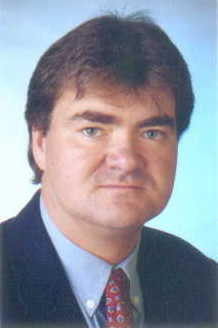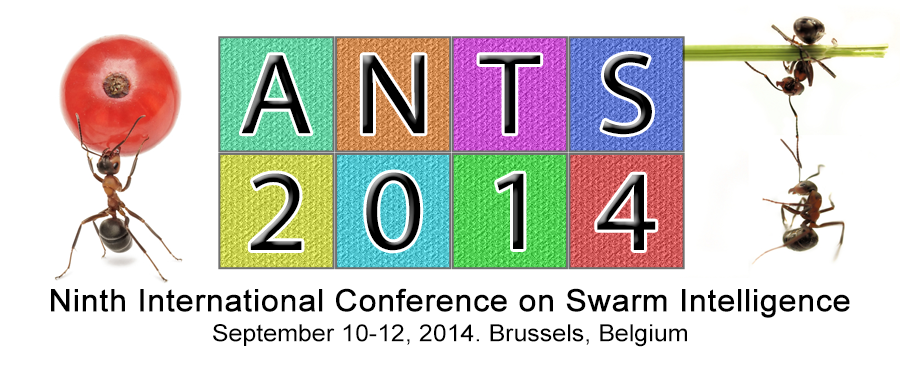ANTS 2014 Invited Talks

All Roads Lead to the Mound
Simon Garnier
Abstract
Like the Roman Empire at its peak, a successful ant colony relies on an effective network of roads that facilitate the movement of its powerful army and industrious population across a vast territory. Fifty years ago, E. O. Wilson discovered the chemical nature of these transportation networks comprised of pheromone trails laid by the colony’s workers. His work paved the way for five decades of study on the incredibly efficient organization of ant colonies, based on simple behaviors, multiple interactions and powerful scents.
In this talk, I will review recent discoveries from field, experimental and theoretical works on the construction and functioning of ant transportation networks. I will highlight the latest findings on traffic organization along ant chemical trails, the topology and geometry of these networks, and the development of support structures on uneven terrains. Finally, I will discuss prospective applications of the ants’ “chemical logic” in operation research and collective robotics, with a particular focus on the flexibility of ant trail systems and their ability to integrate and process multiple sources of information.
In this talk, I will review recent discoveries from field, experimental and theoretical works on the construction and functioning of ant transportation networks. I will highlight the latest findings on traffic organization along ant chemical trails, the topology and geometry of these networks, and the development of support structures on uneven terrains. Finally, I will discuss prospective applications of the ants’ “chemical logic” in operation research and collective robotics, with a particular focus on the flexibility of ant trail systems and their ability to integrate and process multiple sources of information.
Speaker Bio
Simon Garnier is Assistant Professor in the Federated Department of Biology of the New Jersey Institute of Technology (NJIT) and Rutgers University. He did his doctoral work at the University of Toulouse (France) with Dr. Guy Theraulaz and his postdoctoral work with Professor Iain Couzin at Princeton University. Simon is now the head of the Swarm Lab, an interdisciplinary research lab that studies the mechanisms underlying Collective Behaviors and Swarm Intelligence in natural and artificial systems. The Swarm Lab started to operate in July 2012 and its research aims to reveal the detailed functioning of collective intelligence in systems as diverse as ant colonies, human crowds or robotic swarms. Simon is particularly interested in the mechanisms of information transfer and integration in large groups that can lead to adaptive (or “intelligent”) collective responses to environmental challenges.

Critical Review of Modern Bio-Inspired Optimization Methods
Prof. Günter Rudolph
Abstract
The new millennium has witnessed the publication of a multitude
of optimization methods that are allegedly inspired by biological
systems. In this talk I will review a small sample of these methods.
The focus is on the analysis whether there is really a biological paradigm
that has led to a new algorithmic concept or whether the proposed method
is a known algorithm in a new bio-inspired disguise. The latter situation
may occur either unintentionally by scientific ignorance or intentionally as
a simple fraud. I argue that we must fight both cases as they harm the
reputation of computational intelligence. Therefore I will discuss possible
countermeasures for preventing such situations.
Speaker Bio
Günter Rudolph is Professor of Computer Science at TU Dortmund University, Germany.
He studied computer science at the Universities of Karlsruhe and Dortmund. After receiving the
masters degree (Diplom-Informatiker) in Computer Science in 1991 he has been with the Department
of Computer Science at the University of Dortmund in the field of parallel computing. From 1994
to 1996 he was scientist at the Informatics Center Dortmund (ICD). After earning the doctoral
degree in computer science at the University of Dortmund in 1996 he returned to the University
of Dortmund in 1997 for postdoctoral research in theoretical projects of the Collaborative
Research Center on Computational Intelligence (SFB 531). From 2001 to 2005 he served in various
positions in product and software development at Parsytec AG, Aachen (Germany), before he was
appointed Professor of Computer Science.
He was General Chair of the 10th International Conference on Parallel Problem Solving from Nature (PPSN 2008) and associate editor of the IEEE Transactions on Evolutionary Computation (1998-2007). Currently he is serving as editorial board member of the Journal on Evolutionary Computation (ACM/MIT Press) and as General Chair of the IEEE Conference on Computational Intelligence in Games (CIG 2014).
His main research interests currently focus on the analysis and development of bio-inspired methods for multi-objective optimization.
He was General Chair of the 10th International Conference on Parallel Problem Solving from Nature (PPSN 2008) and associate editor of the IEEE Transactions on Evolutionary Computation (1998-2007). Currently he is serving as editorial board member of the Journal on Evolutionary Computation (ACM/MIT Press) and as General Chair of the IEEE Conference on Computational Intelligence in Games (CIG 2014).
His main research interests currently focus on the analysis and development of bio-inspired methods for multi-objective optimization.

Why is reciprocal cooperation so rare in animals?
Jean-Baptiste André
Abstract
An important mechanism by which two individuals can mutually benefit from helping each other is reciprocity (in a broad sense). However, reciprocity is the object of an evolutionary paradox: a gap between theoretical predictions and empirical observations. On one hand, evolutionary modelers have shown that reciprocity can evolve relatively easily in a wide array of circumstances. On the other hand, empirically, very few clear instances of reciprocity are found outside the human species.
In this talk, I will propose a simple explanation to resolve this paradox. I will suggest that reciprocity has rarely evolved because it raises an evolutionary problem of «bootstrapping» of the same kind as communication: it entails the joint evolution of several functions at the same time. Therefore, even though reciprocity may be adaptive once it has already evolved, it cannot be shaped gradually by natural selection.
Along with a mathematical proof of this idea, I will present evolutionary robotics experiments developed in collaboration with Stefano Nolfi (CNR, Rome, Italy) to test this idea. We consider a setting in which two individuals can help each other to forage. In this setting, reciprocal cooperation is evolutionarily stable, because it allows individuals to reach the benefit of cooperation without paying the cost of being exploited by cheaters. However, our experiments show that, in spite of its potential benefit, reciprocal cooperation cannot evolve because of the bootstrapping problem. These results will then be discussed in the context of animal behavior.
In this talk, I will propose a simple explanation to resolve this paradox. I will suggest that reciprocity has rarely evolved because it raises an evolutionary problem of «bootstrapping» of the same kind as communication: it entails the joint evolution of several functions at the same time. Therefore, even though reciprocity may be adaptive once it has already evolved, it cannot be shaped gradually by natural selection.
Along with a mathematical proof of this idea, I will present evolutionary robotics experiments developed in collaboration with Stefano Nolfi (CNR, Rome, Italy) to test this idea. We consider a setting in which two individuals can help each other to forage. In this setting, reciprocal cooperation is evolutionarily stable, because it allows individuals to reach the benefit of cooperation without paying the cost of being exploited by cheaters. However, our experiments show that, in spite of its potential benefit, reciprocal cooperation cannot evolve because of the bootstrapping problem. These results will then be discussed in the context of animal behavior.
Speaker Bio
Jean-Baptiste André is a researcher at the CNRS, working in the Institute of Evolutionary Sciences of Montpellier. He is a theoretician in evolutionary biology. Having earned his Ph.D. in microbial evolution, he is currently interested in the foundations of cooperation, in humans and in other animals. He has developed models in evolutionary game theory on the evolution of human fairness, and on the evolution of reciprocal cooperation. More recently, he has been using tools from evolutionary robotics to account for the role of mechanistic constraints in social evolution.


